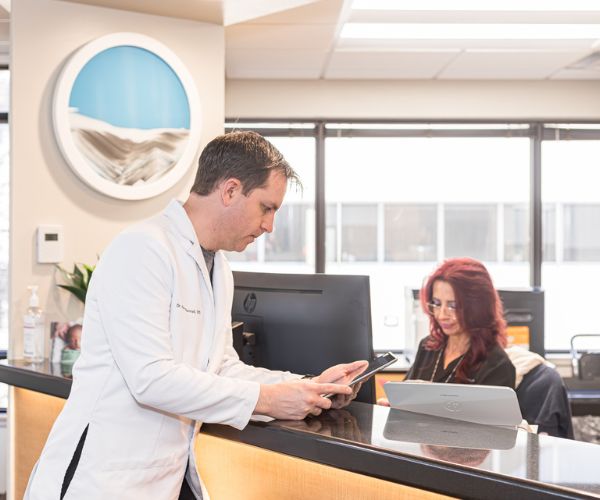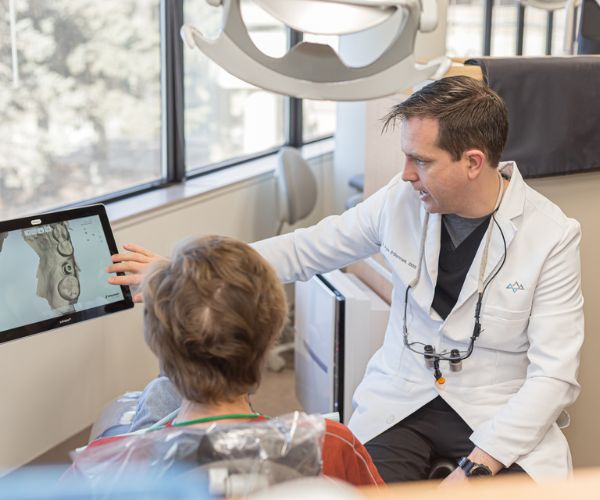What Causes Sensitive Teeth and How to Treat It

What Causes Sensitive Teeth and How to Treat It at Alpine Vista Dental
Tooth sensitivity is a common dental issue that affects millions of people, making simple activities like drinking hot coffee, enjoying a cold dessert, or brushing teeth uncomfortable. At Alpine Vista Dental, we believe in helping patients not only treat sensitivity but also understand its underlying causes. If you’ve been experiencing discomfort, this guide will explain why your teeth might be sensitive and what you can do to find relief.
Common Causes of Tooth Sensitivity
1. Worn Tooth Enamel
Enamel is the hard outer layer that protects your teeth. Over time, enamel can wear down due to brushing too hard, using a hard-bristled toothbrush, or consuming acidic foods and drinks. When the enamel thins, it exposes the inner layer (dentin), which connects to the nerves inside your tooth—causing sensitivity.
2. Gum Recession
When your gums recede, they expose the tooth roots, which don’t have the same protective enamel as the crown of the tooth. Exposed roots are more prone to pain and sensitivity, especially when eating or drinking hot, cold, or sweet items.
3. Tooth Decay or Cavities
Cavities and dental erosion can create holes or weak spots in your teeth that allow outside stimuli—like cold or heat—to reach the nerves, leading to sharp pain.
4. Cracked or Chipped Teeth
A crack in your tooth may not always be visible, but even a small fracture can expose the dentin and nerve endings. This can lead to severe sensitivity, especially when chewing.
5. Teeth Grinding (Bruxism)
Grinding your teeth can wear down enamel and put stress on your teeth, eventually leading to sensitivity. Many people grind their teeth at night without realizing it, which makes regular dental visits even more important.
6. Recent Dental Procedures
It’s normal to experience some sensitivity after procedures like fillings, crowns, or teeth whitening. This usually subsides within a few days, but if it persists, it’s best to consult with your dentist.
How to Treat Tooth Sensitivity
At Alpine Vista Dental, we offer several effective treatments to help reduce or eliminate tooth sensitivity. The right option depends on the cause and severity of your symptoms.
1. Desensitizing Toothpaste
Over-the-counter or prescription desensitizing toothpaste contains compounds that block the sensation from the tooth surface to the nerve. Using these products consistently can help reduce discomfort over time.
2. Fluoride Treatments
Professional fluoride applications at your dentist’s office can help strengthen enamel and reduce sensitivity. We may also recommend fluoride gel for at-home use.
3. Dental Bonding or Sealants
If you have exposed roots due to gum recession, we may apply a special resin to cover the exposed areas and reduce sensitivity.
4. Gum Grafting
For more advanced gum recession, a surgical gum graft may be recommended. This procedure restores the gum line and protects exposed roots.
5. Night Guards for Grinding
If grinding is contributing to your sensitivity, a custom night guard can help protect your teeth while you sleep and prevent further enamel wear.
6. Treating Cavities or Cracks
For teeth affected by decay or damage, we may place a filling, crown, or perform a root canal, depending on the severity. These treatments restore the tooth’s structure and eliminate the source of sensitivity.
Preventing Tooth Sensitivity
While some causes of sensitivity are out of your control, you can take steps to protect your enamel and gums and reduce your risk of discomfort:
Brush gently with a soft-bristled toothbrush
Use a fluoride toothpaste
Limit acidic foods and beverages like soda, citrus, and wine
Floss daily to maintain healthy gums
Avoid teeth grinding or seek treatment if needed
Visit your dentist regularly for cleanings and exams
At Alpine Vista Dental, we can help you develop a personalized prevention plan to keep your teeth strong and healthy for years to come.
When to See the Dentist
If your tooth sensitivity lasts longer than a few days, worsens, or interferes with eating and drinking, it’s time to seek professional help. Tooth sensitivity can sometimes signal a more serious issue like decay, infection, or gum disease. The sooner we identify the root cause, the faster we can help you feel better.
Let Alpine Vista Dental Help
As the best dentist in Highlands Ranch, CO, our team at Alpine Vista Dental is committed to providing gentle, expert care for patients experiencing tooth sensitivity and other dental concerns. Whether you need a simple fluoride treatment or more advanced care, we’ll create a treatment plan tailored to your needs.
Don’t let tooth sensitivity keep you from enjoying your favorite foods and drinks. Schedule an appointment with us today and take the first step toward lasting relief and a healthier smile.






